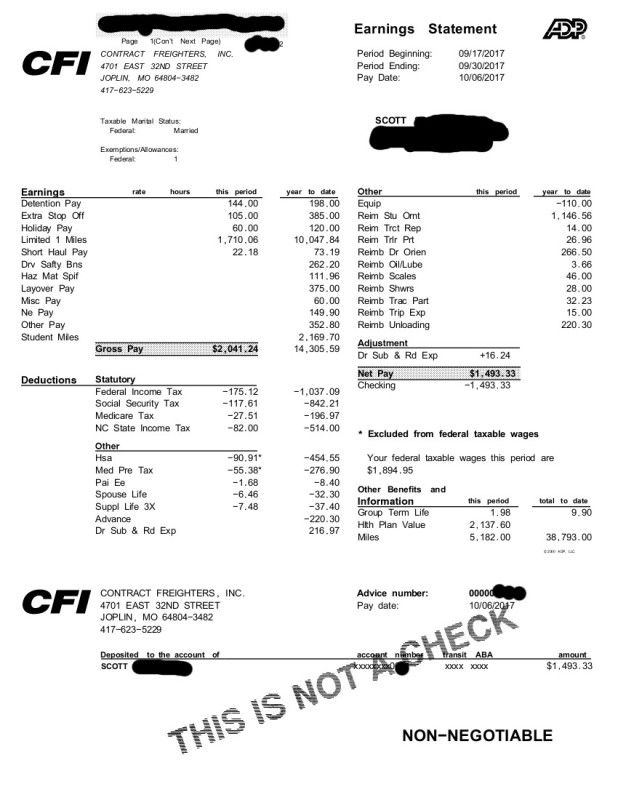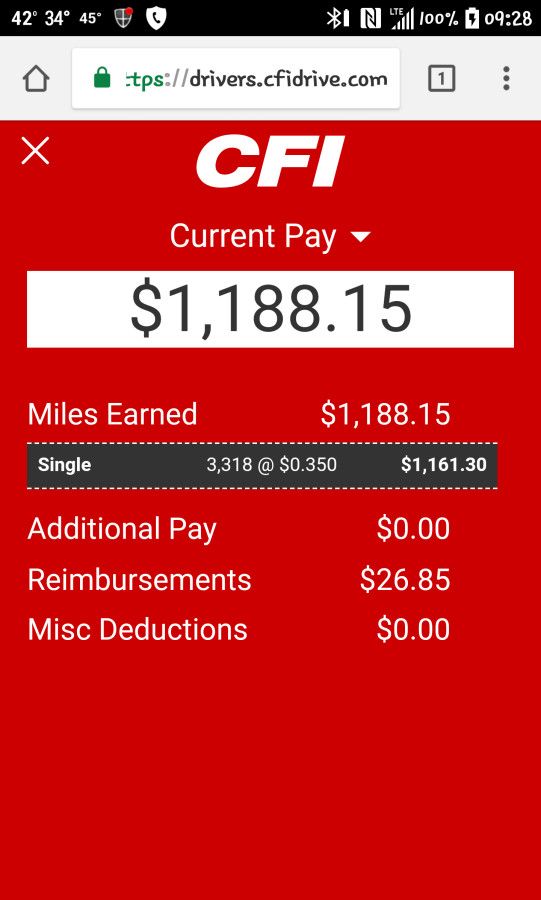My Pay As A Rookie Driver
Topic 20289 | Page 4
I'm parked outside a Sam's DC in Jacksonville Fla. for a 06:45 delivery. It's a live unload, so I don't know how long it will take. Bad part is, I'm out of food except PB&J. lol
I'll be on the lookout for you.
To really have a good handle on weekly pay, we need to total at least several months gross and then see what the rate is for whatever time frame we're interested in (weekly/monthly/annually). Doing so will factor in time off as well as weekly fluctuations in mileage. Looking at pay for any particular week or month doesn't tell us much.
I was looking at the four week pay amounts so it comes to $1100 gross per week.
I still don't understand it cause at .33 CPM even at 3000 miles per week that would be $990. So again...I'm not seeing how this could possibly be reflective of a typical pay. I'd be interested to see what the next four weeks look like.
CPM:
Cents Per Mile
Drivers are often paid by the mile and it's given in cents per mile, or cpm.
When I get home next week I will be updating this with my most recent pay statement.

Dave Reid wrote:
Looking at pay for any particular week or month doesn't tell us much.
I disagree...
In this case it exemplifies the infectious enthusiasm of a brand new driver, finally seeing the fruits of his labor. A trophy of sorts for beating the odds of failure during the long path of schooling and road training.
Big Scott's triumph, like any new driver is something we all appreciate and can relate to.
Dave Reid wrote:
Looking at pay for any particular week or month doesn't tell us much.
I disagree...
In this case it exemplifies the infectious enthusiasm of a brand new driver, finally seeing the fruits of his labor. A trophy of sorts for beating the odds of failure during the long path of schooling and road training.
Big Scott's triumph, like any new driver is something we all appreciate and can relate to.
I'm with G-Town on this. When I began researching here on TT, I wanted to see real numbers. Any numbers. Anything besides just talk would alleviate some of my concerns. So I appreciate what you're doing here Big Scott.
I've refrained from posting my weekly pay, for fear of sounding like I'm bragging. Once the year is up, I plan to post my yearly gross, and break it down monthly as well. I'm on pace to make considerably more than the average first-year rookie.
Bravo Big Scott, keep gettin er done!
Dave Reid posits:
To really have a good handle on weekly pay, we need to total at least several months gross and then see what the rate is for whatever time frame we're interested in (weekly/monthly/annually). Doing so will factor in time off as well as weekly fluctuations in mileage. Looking at pay for any particular week or month doesn't tell us much.
G-Town counters:
I disagree...
In this case it exemplifies the infectious enthusiasm of a brand new driver, finally seeing the fruits of his labor. A trophy of sorts for beating the odds of failure during the long path of schooling and road training.
I feel you are both right. A new driver, after 6 weeks of no pay, and leaving behind whatever career they had before, sure wants to know what they can expect in the first few weeks on the road. On the other hand, once a new driver gets "situated", what can they bring down on a regular weekly basis?
Here is part of a spreadsheet I have kept up since I started at Swift. I include the sections of OTR , and of my regional gig. The missing dates are my work as a shuttle driver, which has a different pay structure from driving around the country OTR.
Please note: the paycheck amounts are "gross pay", not including the deductions we all have. The right-side columns (of money and miles) are a "moving average", which counts the last four paychecks average - sort of a monthly average for the last four weeks.
Regional:
Regional Route
Usually refers to a driver hauling freight within one particular region of the country. You might be in the "Southeast Regional Division" or "Midwest Regional". Regional route drivers often get home on the weekends which is one of the main appeals for this type of route.
OTR:
Over The Road
OTR driving normally means you'll be hauling freight to various customers throughout your company's hauling region. It often entails being gone from home for two to three weeks at a time.
Here is my most recent pay stub, this is for 5182 miles. Our pay period is two weeks.

Starting in January we went back to weekly pay. My first week was spent in the shop. This is the most resent and best gross yet. This makes 3 weeks in a row of $1000.00+ weeks. I have been netting 700 and change from these. When I get home at the end of this month I will post my final 2017 pay stub. Right now I'm making 35 CPM and I'm a little over 10,000 miles from my next pay raise.

CPM:
Cents Per Mile
Drivers are often paid by the mile and it's given in cents per mile, or cpm.
Awesome miles! Way to crank em out!

New Reply:
New! Check out our help videos for a better understanding of our forum features

















Preview:
This topic has the following tags:
Truck Driver Salary







 TT On Facebook
TT On Facebook
No wonder I've seen so many CFI trucks the past few weeks. I have been very close to three of your terminals--KC, Joplin, and West Memphis. I didn't go too close to Joplin but I went through Springfield, so pretty close. I've gone through Memphis and KC the last two weeks.
Right now I'm kinda "stuck" on a Golden, CO, to Albany, GA, run with a backhaul from Tupelo or Ecru, MS, to Englewood, CO (it's our best run, so I don't mind it LOL). So I go through CFI's main lanes every week right now. I'm always looking for that "Big Scott" on the doors. You can look for me too. I drive a white Prostar, truck 1088. All our trucks have huge cattle guards (the biggest ones I've ever seen LOL), and we always pull AFW trailers, so we're hard to miss. Right now I'm parked at the Pilot in Albany taking my 10 before I deliver tonight. If they don't take too long tonight I'm gonna try to make it back to Jonesboro, AR, by morning.
Sorry you don't get to go home this time. I know the feeling. I've had to spend the night in my truck just an hour from my apartment many times when I was running Miller Coors with Swift.
Terminal:
A facility where trucking companies operate out of, or their "home base" if you will. A lot of major companies have multiple terminals around the country which usually consist of the main office building, a drop lot for trailers, and sometimes a repair shop and wash facilities.